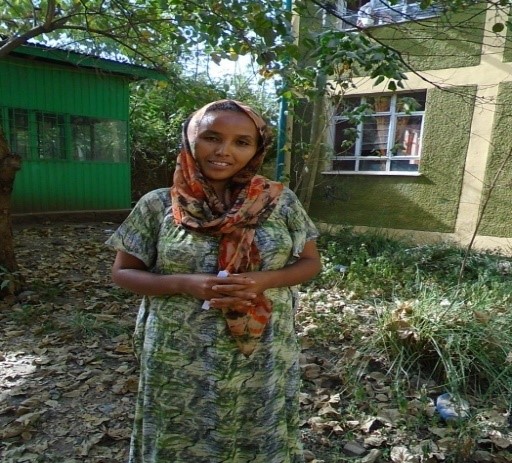A lack of economic opportunities for young people is one of the main driving factors of poor sexual reproductive health (SRH) outcomes in Ethiopia’s young population. In North Shewa, exponential population growth and poor living conditions are creating barriers to livelihood opportunities which is consequently aggravating poverty in the region. Those most vulnerable are unemployed, out of school youth and young people living in remote areas. Feelings of low self-confidence and no anticipation of a positive future limits the ability of young people in North Shewa to make safe and informed decisions regarding their sexual and reproductive health rights.
Meseret Geto, 25, lives in the North Shewa Zone of the Amhara region, within Antsokiya District at Mekoy town. She was one of three children who grew up in a low-income household. The realities of poverty forced her to leave school at the age of 12, during grade six. Like most of her friends, Meseret entered a forced marriage at the age of 12. Early marriage remains a common practice in the Antsokiya District. For Meseret, her early marriage was short lived and resulted in a divorce. She describes her experience of being forced into an early marriage as traumatic and has led her to have a negative perception of marriage.
Poverty pushed Meseret to leave her home in North Shewa and migrate to the Middle East in search of economic opportunities. This migration of Ethiopia’s young population, particularly young women, has become a common occurrence. Meseret as one of many Ethiopian young people to migrate to the Middle East seeking for a better life, experienced several hardships:
‘’I migrated two times, first legally by paying 12,000 ETB by Ethiopian Airlines and second illegally by paying 10,000 ETB to an illegal Ethiopian broker and 15,000 ETB to a broker from Arab country. The illegal migration I decided to go through was dangerous. We were 25 when starting the journey. After one month of risky travel, only 10 of us arrived at the intended destination country. Some were hacked to death by human traffickers and a few lost their life at the desert and in the ocean during the journey. In spite of this, I managed to reach the destination country and started working as a domestic worker. After four months, I finally returned to my home country without any tangible benefit. Totally, I paid 37,000 ETB for brokers to take me to one of the Arab countries; all of the money was borrowed from different people in hopes of a positive future, but I couldn’t even cover my expenses during my stay in my destination Arab country.’’
Speaking on the challenges she faced to engage in income generating activities in her home country, Meseret states, “Had I received entrepreneurship, financial management, business development, and life skill training before I illegally migrated, I would not have had to pay 37,000 birr to brokers. I could have used that money to start a small business. Previously, I didn’t have much knowledge and skills in entrepreneurship and financial management. The training I recently received through Amref Health Africa SEE project has enabled me to have self-confidence and stop dreaming of migration.’’
The Service, Education and Empowerment (SEE) project implemented by Amref Health Africa in Ethiopia supports and creates income generating opportunities for young people. In partnership with the local government, the SEE project provides skills-based training and start-up grants to improve the livelihood of young people in the North Shewa Zone, and thereby reduce their risk of sexual reproductive health related problems. Amref Health Africa in Ethiopia collaborates with the government Technical, Vocational Training office to provide a six days entrepreneurship, financial management, business development, and life skills training to young people in the region.
Meseret has now learned how to be an entrepreneur and manage her money. She has recently started working as petty trader with her mother. She is also working as an independent hair dresser. She is determined to become self-sufficient and not depend on the support of relatives to start a business. She feels the most important thing is a changing attitude and actively looking for new opportunities. She is focused and optimistic that her business will flourish soon. “Thanks to Amref Health Africa and the government, they have now showed me a new direction and changed my dream of migration,” Meseret said. “Unlike men, we young women are not allowed to decide to whom and when we get married. The life skills training I received from the Amref project has also empowered me to make my own decision on when and whom I should marry,” Meseret added.
Amref Health Africa teams up with African communities to create lasting health change.

